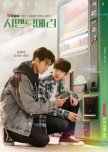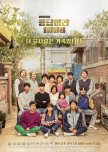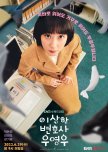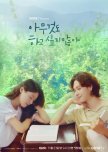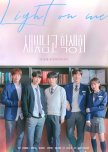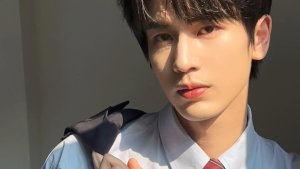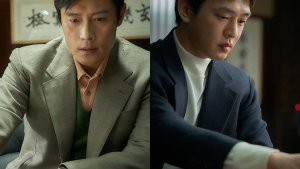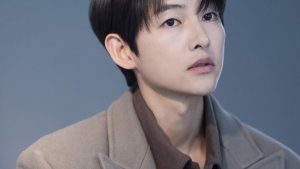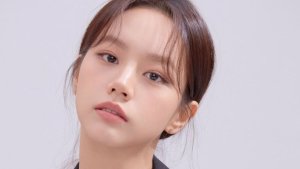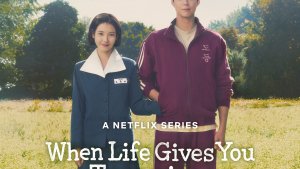Autistic & Autistic-Coded Characters
This list contains autistic and autistic-coded characters as main or supporting roles. This list is subjective and based on my personal opinions, with exceptions clearly noted.
SPOILER ALERT: This list contains spoilers from start to finish!
-
1. Semantic Error
Korean Drama - 2022, 8 episodes
Character & Description:
Chu Sang Woo, First Male Lead
Stereotypical portrayal of a male computer science student who is rigid, highly rational, and fully committed to his philosophy of right and wrong. Sang Woo gets tangled up with the other male lead when he reports a lack of participation on a group project that ultimately causes the other male lead to fail the class, delay graduation, and seek revenge.
What I Liked:
- Sang Woo clearly demonstrated one of the strengths of autistic thinking, which is being less susceptible to peer pressure
- Some of the relationship conflict was around Sang Woo's inability to perceive the attention of a female classmate as flirtation
- Once the romance takes off, the other male lead's art school friends embrace Sang Woo's quirkiness and clean up their studio space, upon his insistence
- When the other male lead was offered an opportunity to work abroad, Sang Woo whole-heartedly supported him, though his thought-process for arriving at that conclusion was surprising to the other male lead.
What I Didn't Like:
- The enemies to lovers trope sometimes edged into bullying or stalking behaviors. While it juices the enemies to lovers narrative, this would probably be triggering and unwelcome for autistic people who are often predisposed to being bullied
- The other male lead posts embarrassing photos of Chu Sang Woo to social media, when he has explicitly been asked not to. That's not okay under any circumstances.
-
2. Als het mooi weer is
Korean Drama - 2020, 16 episodes
Character and Description:
Im Eun-Seob, First Male Lead
This story is centered around a Korean folktale about a naive little boy who is often hurt by others. One day when he is walking in the woods he meets a wolf who offers him a silvery eyebrow that allows him to see humans for who they really are. When he uses it, he realizes that everyone is a calculating fox or a thieving raccoon and that there are no humans with pure intentions. It is clear the writer is drawing a parallel between the boy in the fairytale and Eun-Seob.
Things I Liked:
- There’s a really poignant moment where Eun-Seob talks about people who “build a cabin in their hearts” and learn to prefer being alone, keeping their secrets and their pain to themselves
- Eun-Seob is a very quiet person, however, he is quite articulate about books which are both his job and special interest. He also says he often organizes them in order to fall asleep. He is described as having a lot of useless knowledge, which is a neurotypical way of talking about having a variety of special interests
- Eun-Seob is portrayed as a fully-fledged adult who dresses appropriately for his age, has a small business selling books online, and a small diverse group of friends through bookclub he hosts. His wilderness survival / rescue skills are celebrated by the community.
- Eun-Seob deals with one of the most common symptoms or co-morbidities, insomnia
- Eun-Seob is easily embarrassed, scattered, or overwhelmed when he has to navigate complicated social interactions. However, he also has a sense of humor and can joke about himself.
Things I Didn’t Like:
- When Hae-won shows up at the end, expecting to pick up where they left off, not recognizing how difficult transitions would be for someone like Eun-Seob
- Hae-won hugging Eun-Seob without asking might make for good TV but is ill-advised IRL
-
3. Reply 1988
Korean Drama - 2015, 20 episodes
Character & Description:
Choi Taek, First Male Lead (and his father by implication)
Stereotypical male autistic savant character who is an international Go champion, while being unable to perform daily tasks of living like feeding himself, driving safely, or using directions to get somewhere new. He also uses substances to cope with sensory issues, insomnia and stress of international competition.
What I Liked:
- This was a more realistic portrayal in the sense that this autistic character had real support needs
- His friends seemed to accept Choi Taek as he was and celebrate his wins, he was included as an equal member of the friend group
- His friends prompted him to engage in self-care behaviors like eating, sleeping, wearing weather-appropriate clothing, not overdosing on meds, and identifying when he was being manipulated, which seemed to suggest they understood how they could support him
- In the romantic arc, the second male lead respected Choi Taek as a real, viable option for the female lead and respected Taek’s interest in her by engaging in “bro code” behaviors. Setting aside the problematic nature of bro code, it showed that the second male lead respected Choi Taek as a person and an adult, who got the same treatment as any other male friend.
What I Didn't Like:
- His friends made fun of him for being hopeless or clueless about practical matters and infantilized him (e.g. “don’t teach him to swear!”)
- Some supports were discussed and/or provided in a condescending way
- This character reinforces the stereotype that autism and savant-like abilities are common
- The character they used to portray the adult version of the male lead didn’t carry on these themes consistently and the contrast was jarring.
-
4. Because This is My First Life
Korean Drama - 2017, 16 episodes
Character and Description:
Nam Se Hee, First Male Lead
This character is a stereotypical portrayal of the grumpy male lead software engineer that has only one or two friends and leads a life of routine.
What I Liked:
- The contract relationship drawn up by the autistic character allows the story to explore the benefits of clear expectation setting and communication and pushes on the idea that romantic love is about mystery, suspense, and tacit understanding
- The character is literal and principled to the point of being rigid and it makes for some lovely moments, like when he spends all day making kimchi at his in-laws to repay the female lead's labor at his family memorial dinner, even though that is perceived as “womens’ work.”
- This story did a better job than most of conveying quiet as a symbol of a rich inner life, rather than a boring personality, using a "still waters run deep" kind of vibe.
- The character demonstrates alexithymia, or a lack of insight into his own feelings, when processing both his current and previous relationship
- Nam Se Hee puzzles the female lead by expressing a wish that everyday in the future would go on the same way, which I thought was a good way of getting at both how much he liked having her in the house and how important to routines are to him.
What I Didn't Like:
- When the female lead engages in manipulation toward the end of the drama, it seems like an especially egregious violation of trust. Nam Se Hee naively believes she really leave the country when in fact she's been in a nearby neighborhood for months.
- When the female lead pops back up at the end of the drama, expecting to pick back up where they left off now that's she's ready, it displayed a real lack of insight into the importance of routine and the stress of transitions, even good ones.
-
5. My Holo Love
Korean Drama - 2020, 12 episodes
Character and Description:
Go Nan Do, First Male Lead
Go Nan Do is a brilliant AI programmer and entrepreneur, but hides behind someone else as the official face of the company. He got his start in AI when his mother, an AI Researcher, created an AI to be friends with her young son because she was worried about him. It is implied but not clearly stated that he is autistic.
What I Liked:
- The conversations that Go Nan Do has with the AI around what it means to follow and break rules are an interesting exploration of rigidity and systemization applied to social environments at scale
- The most humorous moments of the drama occur when Go Nan Do has to fill in for the AI while it is being repaired. It brings up the challenges of masking in a light-hearted way.
What I Didn’t Like:
- The character (not including the AI he built as his foil) is fairly one-dimensional
- The romantic arc for this character doesn’t make a ton of sense. It is never very clearly explained why he starts to like the female lead when he initially views her as an impediment to the production deployment of his AI
-
6. The Lighter and the Princess' Gown
Chinese Drama - 2022, 36 episodes
Character & Description:
Li Xun, First Male Lead
Stereotypical portrayal of a savant-like male hacker/software engineer with clinical levels of detachment and a mastery of game theory.
What I Liked:
- “Melt the tsundere” is a favorite trope and this character served that up in spades
- The character had excellent pattern recognition and an intuitive understanding of social psychology, which he leveraged to overcome challenges
- The character demonstrated an apparent lack of concern for social norms and did not buckle under peer pressure
- The character was extremely principled and rigid in his personal philosophy but did learn to flex and for the important people in his life
- His nickname came from a stimming behavior of flicking a lighter, one of his favorite objects, which was also a significant plot point
What I Didn’t Like:
- At times he treated people like pawns, including the female lead, perpetuating the stereotype that autism always goes hand in hand with narcissistic or sociopathic behaviors
-
7. Wol Soo Geum Hwa Mok To
Korean Drama - 2022, 16 episodes
Character and Description:
Jung Ji Ho, First Male Lead (Recommendation from Afternoona Delight podcast)
Ji Ho, a taciturn judge, hires a contract marriage specialist, Sang Eun, and cooks for her three nights a week for five years, preparing elaborate dinners and saying very little. The two fall for each other slowly over those quiet dinners, which are a refuge for Sang Eun who spends most of her time pretending to be the perfect wife or fiancee.
What I Liked:
- Ji Ho countered misconceptions about the lack of empathy by being extremely caring and attentive to Sang Eun, preparing her favorite meals and even noticing when she needed feminine care products on the golf course
- This show highlighted the challenges autistic people face at work in getting professional recognition, despite being very good at their jobs
- The second male lead gave Ji Ho no meaningful competition, despite being a good looking & successful movie star, underscoring that autistic people are wonderful romantic partners
- Ji Ho had a sense of humor and didn’t take himself too seriously, teasing Sang Eun by saying things like “actually I am very smiley person” with a completely straight face
- You could see Ji Ho melting down on the inside whenever Sang Eun cooked in his kitchen and the lengths he went to in order to avoid her cooking in the future were comical
- Ji Ho is engaging in social skills training as an adult
What I Didn’t Like:
- Ji Ho’s boss behaves in really disrespectful and infantilizing ways toward him
- There were some weird serial killer vibes in the early episodes. That might have been a kdrama inside joke about one Go Kyung Pyo’s prior roles but without that context, it just perpetuates weird / bad stereotypes.
-
8. One Shot Scandal
Korean Drama - 2023, 16 episodes
Character & Description:
Nam Jae Woo, Support Character (brother to the female lead) and employee at the family business.
What I Liked:
- Nam Jae Woo lives for "Chicken Night," the one night a week where his family orders in and he gets to pick what they watch, which is one of a handful of documentaries about wildlife
- Nam Jae Woo gets into scrapes with the police, due to someone mistaking his rigidity around routine and specific food preferences for stalking. This brings up a good point about needing mental health trained first responders who understand neurological and mental health conditions, not just law enforcement.
- While savant-like characters make for better television, autistic adults with moderate support needs and no particular genius are a much more common scenario and this character was a representation of that.
What I Didn’t Like:
- Nam Jae Woo is dressed like a child with pants that were slightly too short. I was bummed because there’s a kdrama standard of people being well-dressed, even when they are relaxing at home. There’s no reason why he couldn’t have clothes that fit him properly, as his family clearly demonstrated dress-sense and were wearing product placement clothing that fit beautifully and was valued at hundreds or thousands of dollars per piece.
- The romantic arc doesn’t respect Nam Jae Woo as an adult or an individual. It was extremely disappointing and you could tell the actors were cringing even while they played it.
-
9. Extraordinary Attorney Woo
Korean Drama - 2022, 16 episodes
Character & Description:
Woo Young Woo, First Female Lead
"First" female autistic attorney in Korea, with a photographic memory and a special interest in law. She solves complex cases, hangs with her best friend, and falls into an office romance with a cute paralegal.
What I Liked:
- This was the first autistic female lead I have seen in kdrama, almost all other autistic characters have been male.
- Her special interest in whales turns into a beautiful motif throughout the series, as well as several opportunities for levity in the midst of a court drama
- Her best friend Dong Gu Rami strikes a good balance of being supportive of her needs and preferences, while occasionally pushing back on unreasonable expectations. One of my favorite friendship moments in kdrama was when Dong Gu Rami dragged herself out of bed to help Woo Young Woo find and destroy the mechanical clock that was preventing her from sleeping.
- Woo Young Woo displays characteristics like naïveté, info-dumping, and stimming
- The first male lead tries to educate himself in advance about what it is like to be autistic so he can be more sensitive to his girlfriend’s needs
- The couple finds creative ways to work around the autistic character’s sensory issues, “holding hands” through a window
What I Didn’t Like:
- Woo Young Woo is treated like a child by her family, friends, coworkers, and even occasionally by the male lead (e.g. when he isn’t forthcoming about not wanting to do certain types of activities on dates)
- Savant-like skills make for good television but they are exception rather than the norm
- "First" female autistic attorney is really "first unmasked" female autistic attorney and doesn't recognize complex issues around masking
-
10. I Don't Want To Do Anything
Korean Drama - 2022, 12 episodes
Character & Description:
An Dae Beom, First Male Lead
An Dae Bom is an extremely quiet, bright, and accomplished physics academic who struggles with neurological and/or mental health issues. This eventually leads him back to his hometown to work in a library, where he meets the female lead who is taking the adult version of a "gap year."
What I Liked:
- An Dae Beom treats the books in his care with such affection; it is clear he has a very real, very important relationship with them.
- Depictions of the challenges of missing social cues and naïveté including Dae Bom being taken advantage of by his academic collaborator and inadvertently leading on his co-worker at the library has a romantic interest in him.
- Running seems to be both his primary coping strategy and a routine that anchors him. When trauma triggers him, he has really limited coping strategies and there were some scary moments for this character.
- I liked how the male and female leads had a slow, quiet, sweet romantic arc with a good amount of awkwardness, however, they kept moving toward one another. It was heartwarming!
- This character actually brings up a good point about the difficulty distinguishing between cPTSD & Autism, as he’s experienced multiple traumatic losses of family members.
What I Didn’t Like:
- There are some points where you question whether An Dae Beom is the perpetrator of a violent crime or crimes, which perpetuates unhelpful stereotypes about sociopathic behaviors.
- While multiple co-morbid diagnoses are common for autistic people, at points this drama seems like the writer selected symptoms from a grab-bag of various neurological and mental health conditions depending rather than trying to make a coherent whole person narrative
-
11. Suspicious Partner
Korean Drama - 2017, 40 episodes
Character and Description:
No Ji Wook, First Male Lead
No Ji Wook is a prosecutor, infamous for his ruthless approach to his work. Through a series of unexpected events he gets tangled up with the female lead who is accused of murder. He loses his job, starts his own law practice, and continues working behind the scenes to help the female lead solve the mystery of who actually committed the murder for which she was acquitted. This character doesn't ring true for me but I added it because this character is commonly recognized as autistic-coded.
Things I Liked:
- This character does meltdown when other people are talking too much, too loudly, or all at the same time
- Some of the relationship conflict is around this character being slow to understand his own feelings, which resonates
- The character is highly principled and rigorously follows his philosophy. Part of the romantic arc is the male and female lead learning to make accommodations for one another and communicate more effectively, despite having very different ways of thinking and being
Things I Didn't Like:
- Something about this character felt off. The actor seemed more focused on smoldering than giving a consistent portrayal of this type of character. In fairness to him, I know that's exactly what people come to JCW dramas expecting to see.
-
12. Saebit Boys' High School Council
Korean Drama - 2021, 16 episodes


